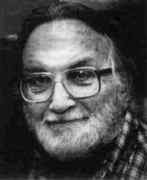Person: Zorn, Max August

Max Zorn was a German mathematician, best known for the so-called Zorn's lemma, equivalent to the Axiom of Choice .
Mathematical Profile (Excerpt):
- Hamburg was Artin's first academic appointment and Zorn became his second doctoral student.
- We shall explain below what an alternative algebra is and describe some of the mathematical contributions which Zorn made at this time.
- Zorn emigrated to the United States and was appointed a Sterling Fellow at Yale University.
- He worked there from 1934 to 1936 and it was during this period that he proposed "Zorn's Lemma" for which he is best known.
- We describe below the form in which Zorn originally stated this result.
- Since Zorn is best known for "Zorn's Lemma" it is perhaps appropriate that we should begin a discussion of his mathematical achievements by considering this contribution.
- Of course Zorn did not call his result "Zorn's Lemma", rather it was given by him as a "maximum principle" in a short paper entitled A remark on method in transfinite algebra which he published in the Bulletin of the American Mathematical Society in 1935.
- Perhaps in passing we should note that the name "Zorn's Lemma" was due to John Tukey.
- Zorn's aim in this paper was to study field theory and in particular to improve on the method used for obtaining results in the subject.
- What Zorn proposed in the 1935 paper was to develop field theory from the standard axioms of set theory, together with his maximum principle rather than Zermelo's well-ordering principle.
- The form in which Zorn stated his maximum principle was as follows.
- Zorn defined a collection of sets to be closed if the union of every chain is in the collection.
- His maximum principle asserted that if a collection of sets is closed, then it must contain a maximal member, that is a set which is not a proper subset of some other in the collection.
- The paper then indicated how the maximum principle could be used to prove the standard field theory results.
- Today we know that the Axiom of Choice, the well-ordering principle, and Zorn's Lemma (the name now given to Zorn's maximum principle by Tukey and now the standard name) are equivalent.
- Did Zorn know this when he wrote his 1935 paper?
- Was Zorn's idea entirely new?
- investigates the claim that "Zorn's Lemma" is not named after its first discoverer, by carefully tracing the origins of several related maximal principles and of the name "Zorn's Lemma".
- Zorn made other contributions to set theory, such as his 1944 paper Idempotency of infinite cardinals in which he proved that an infinite cardinal number is equal to its square.
- His proof uses his maximum principle rather than using ordinal numbers as had been done in previous proofs of the result.
- In addition to his well known work in infinite set theory, Zorn worked on topology and algebra.
- Zorn went on to publish four papers on alternative algebras.
- In Alternative rings and related questions I: existence of the radical published in 1941 Zorn considered the theory of the radical of an alternative ring.
- We have looked briefly at Zorn's contributions to algebra and to set theory.
- After 1947 Zorn stopped publishing mathematical papers.
- Max's published work, as significant and substantial as it is, is not what we will remember him by.
- It is rather Max's life-long dedication to mathematics and his apparently endless curiosity about mathematical ideas that we remember and from which we draw inspiration.
- Outside speakers were usually charmed by Max and his passion for mathematics.
- Zorn did spell this with two c's but it is named after the newspaper the New Orleans Picayune.
- It was a one-sheet affair that Max called the world's smallest newspaper and that he gave to a few friends (usually by putting copies into his colleagues' mailboxes, and rarely, for distant friends, by mailing them).
- The contents of the Piccayune Sentinel were of the same kind as Max himself and his postcards (and as unpredictable and as confusion-inducing) ...
Born 6 June 1906, Krefeld, Germany. Died 9 March 1993, Bloomington, Indiana, USA.
View full biography at MacTutor
Tags relevant for this person:
Origin Germany
Thank you to the contributors under CC BY-SA 4.0! 

- Github:
-

- non-Github:
- @J-J-O'Connor
- @E-F-Robertson
References
Adapted from other CC BY-SA 4.0 Sources:
- O’Connor, John J; Robertson, Edmund F: MacTutor History of Mathematics Archive
